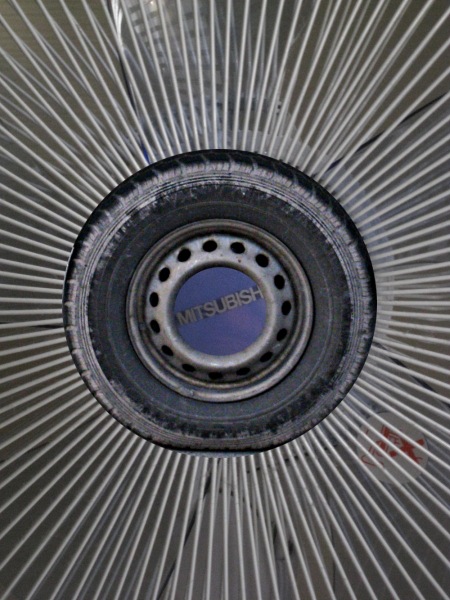
This will be a post about cars, nuclear power and economic stimulus programs.
The Monju Fast breeder reactor (FBR) and its follow-up model developped by Mitsubishi was already mentioned in this randform post.
The Monju reactor, which belongs to a rather dangerous and problematic type of nuclear power plant and which suffered a sodium leakage in December 1995, was supposed to reopen this october. This plan has been now put back to February 2009 (while there is also FBR and related R&D at Oarai In Ibaraki prefecture according to world nuclear.)
A sort of obvious reason for Mitsubishi‘s involvement in nuclear power development seems to be that Mitsubishi is producing electrical gadgets – which need of course electrical power. A similar connection we have also e.g. between Siemens and Areva.
Among these electric gadgets are e.g. plug-in electric cars.
It’s a well-known fact that japanese cars are at the forefront of plug-in and other electric car development, and thus the corresponding companies are always looking for possibilities for expanding these products, like e.g. in this recent cooporation in Oregon, where the Renault-Nissan Alliance has announced that Nissan and the state of Oregon are forming a partnership to promote the development of an electric vehicle (EV) charging network.
Putting one and one together this thus means:
electric cars often called “green cars” should be seen more critical.
So first one should make a difference between hybrid electric cars, which have a more efficient use of energy and plug-in/battery (hybrid) electric cars, which need additional electric energy (usually provided by a plug). In particular
if the electric energy of an electric car doesn’t come from a renewable energy source then the green car isn’t green at all! (apart may be from the exhaustion)
and
If the expansion of electric cars is faster than the development of renewable energy sources then this will almost inevitable mean that nuclear energy (for producing electric power but also for the production of hydrogen fuel) will be needed.
Hence the car industry in Japan is apparently thinking that the development of renewable energies won’t be fast enough and thus for them it is important to promote nuclear energy.
In a series of posts (e.g. see please here) I tried to explain what this implies.
Put very shortly furthering nuclear energy implies the future use of socalled breeder power plants (like e.g. the above mentioned Monju plant or these here). These plants constitute a rather new and untested technology with a high proliferation risk and the danger of a self feeding plutonium economy. In addition all of this implies also an impending nuclear waste disaster.
Moreover the apriori great use of electric cars as an electric buffer within an electric net , the socalled vehicle-to-grid system –which is especially important for an efficient use of peak electricity, usually involved with renewable energies such as solar energy) – would lie idle.
What to do
Due to the current crisis of the car industry (the german government still thinks about bailing out Adam Opel GmbH-the german general motors daughter) there was the proposal of a german renewable energies company called solarworld to buy Opel. The proposal was rather perceived as a PR Gag, given that solarworld has not so much experience with cars (although they e.g. sponsor the solarcar) and the fact that solarworld has about 2300 employees, whereas Opel has about 30.000 employees. (Apart from this it is apparently not so easy to unhinge Opel from GM).
However the fact that the above was mostly considered as a funny PR gag displays a certain imbalance and unconnectedness between major car producers and renewable energy providers, which do not seem to exist for the nuclear energies as pointed out above. (It would be interesting to compare e.g. Siemens investments into nuclear and renewable energies). Last but not least solar cars from commercial producers (e.g. here) are still in the concept stage.
So given the above danger of a rather rapid expansion of nuclear energies – which would be partially due to the car industry – it is obvious that something has to be done. This is in particular necessary in view of the current little boost in the production of photovoltaic elements. According to this article these elements may be subject to an upcoming rapid price decline (and thus a possible death of solar industries) if they do not find fast enough applications.
According to an internal paper of the german federal government and Reuters and Spiegel there are plans that within an apparently projected Economic-Stimulus Package the European bank EIB intends to further green car technologies with 2 billion Euro.
So if this program comprises e.g. just a pure investment in plug-in electric cars than this would be – as outlined above- too shortsighted, if not bad in the long term. But if the program comprises investments into innovative hybrid and network solutions, like the above mentioned vehicle to grid system (again Siemens doesnt seem to think about this, at least I couldnt find something on their website) and a better coordination with the development of renewable energies then this could be a right step. These things should also be considered while thinking about bail-outs for the car industry. Promoting public transport by the way is also important.
Concluding:
Despite the bleak outlooks concerning the climate change (and these are bleak) promoting power generation from nuclear energy makes things just worse.
And again: It is not that I fear that individual power plants can’t be made considerably safe.




June 17th, 2021 at 8:14 pm
nad wrote:
You seem to forget that clean air is one of the most important demands of modern cities, so alone the waaaay better “exhaust balance” of electric cars is enough to promote them.
But of course things can be improved as it is written in a brochure by the German Ministry for the Environment, Nature conversation and Nuclear safety:
So it is important to cut down on manufacturing emissions and modern nuclear is best for this.
By the way its’s called exhaust – not exhaustion.